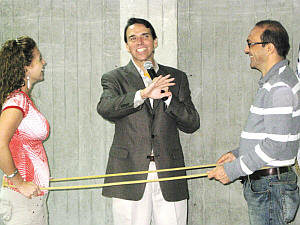 We all like to get a little extra. Getting a little bit more than we expect elicits emotions which make us feel wonderful. Giving a little extra to our clients, patients, contributors, users, friends and family generates dividends beyond our wildest imagination.
We all like to get a little extra. Getting a little bit more than we expect elicits emotions which make us feel wonderful. Giving a little extra to our clients, patients, contributors, users, friends and family generates dividends beyond our wildest imagination.
A little extra can come in the form of economic benefit as well as intention or action. “Promise a lot and deliver more” is a concept I first learned from Joel Weldon during a seminar in 1989. I have since kept the maxim close to my heart.  When we deliver on our promise to provide an excellent product or service and then give a little extra, the competition, which tends to be a nightmare for others, becomes a fountain of opportunity for us.
When we deliver on our promise to provide an excellent product or service and then give a little extra, the competition, which tends to be a nightmare for others, becomes a fountain of opportunity for us.
Those who have attended my events know I often give bouncy balls to affirm my philosophy that “It’s the Bounce that Counts!” This is my little extra. It is my way of spreading my message to as many people as I can. When attendees at my seminars or conferences get back to their work places or homes bouncing a little ball, it can lead to discussions regarding my idea. I have had the immense pleasure of sharing my ideas with more than 7,000 people in various events. That means there are a lot of bouncy balls out there! I frequently encounter people who tell me, “Though I don’t remember your name, aren’t you the one with the bouncy balls?”
I have had the immense pleasure of sharing my ideas with more than 7,000 people in various events. That means there are a lot of bouncy balls out there! I frequently encounter people who tell me, “Though I don’t remember your name, aren’t you the one with the bouncy balls?”
If it is possible to give a little extra using something of material value, then great; if not, there are still many other ways we can give a little extra.
A few examples:
Acknowledge all with a sincere smile.
Give one more idea than what is expected.
Learn and use people’s names to greet them.
Create positive expectancy by being open and understanding.
Leave or send notes telling people how important they are to us.
Use language which permits all to understand subjects with complex terminology.
Listen to what people have to say rather than constantly thinking about how we will respond.
Offer candy to customers who walk in the door telling them we would be happy to help if they so desire.
Call clients, friends and family on their birthdays, anniversaries as well as during times of trial and tribulation.
 Give big meaningful hugs whenever appropriate. Personally, I need at least eight hugs a day just for maintenance!
Give big meaningful hugs whenever appropriate. Personally, I need at least eight hugs a day just for maintenance!
End all encounters showing a genuine appreciation with an even bigger smile.
The sky is the limit and creativity is master. It is important to let people know how significant they are because one of our greatest necessities as human beings is to be acknowledged, to be taken into account. When we give a little extra to others, we provide an extraordinary gift.
∞ Rob McBride ∞
LL II 17

